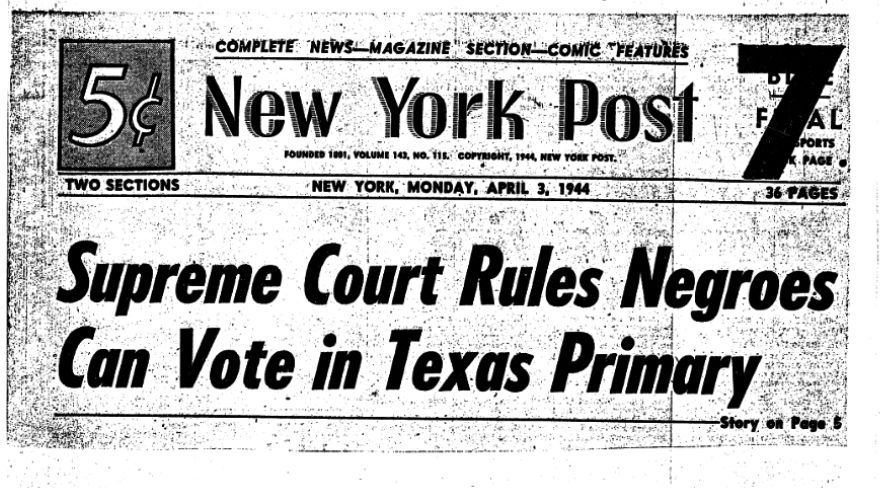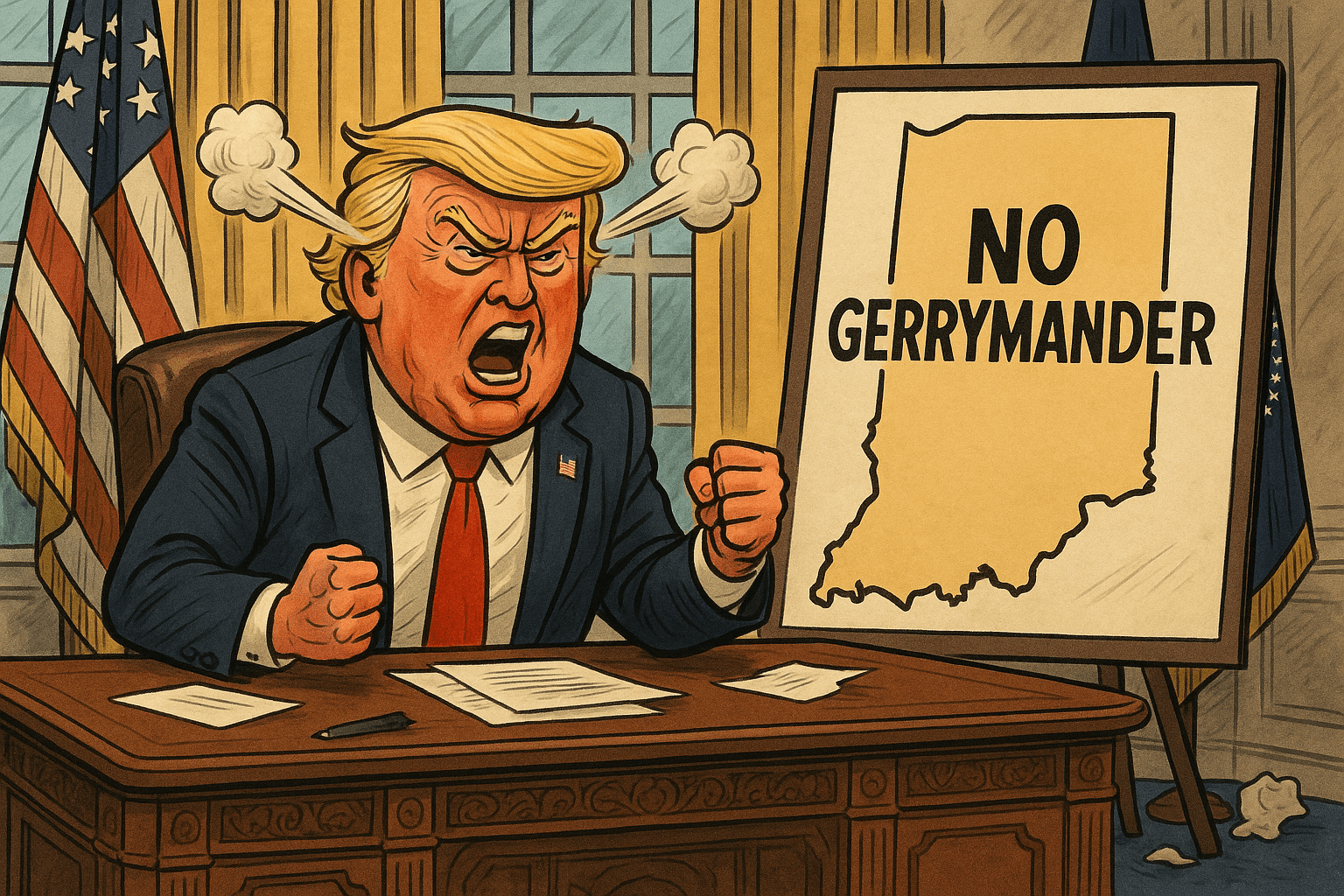Paxton Concedes He Has a Conflict of Interest in Texas Primary Lawsuit

Texas Attorney General Ken Paxton is taking the extraordinary step of refusing to defend the state’s election laws and the Texas secretary of state in a federal lawsuit filed by his own political party, even as he runs in the very election those laws govern.
Instead of doing his job as the state’s top lawyer to defend the people of Texas, its chosen election system, and the officials who administer it, Paxton has essentially switched sides, joining the Republican Party of Texas in its demand for the federal court to immediately close the GOP primaries to party members only.
To read the joint motion for entry of consent judgment, click here. To read the proposed order and final judgment, click here.
The lawsuit, originally filed on September 4, 2025, in the U.S. District Court in Amarillo, seeks to end Texas’s long-standing system, which allows all registered voters, including independents, to participate in either party’s primary.
The open primary system, in place for decades, is designed to encourage broad voter participation and ensure that unaffiliated voters have a voice in selecting candidates who appear on the general election ballot.
The question of who gets to vote in Texas primaries isn’t new. In fact, the state has faced major legal challenges over it before.
Back in 1944, the U.S. Supreme Court ruled in Smith v. Allwright that Texas could not let political parties set their own rules in a way that excluded voters. At the time, the Texas Democratic Party only allowed white voters to participate in its primaries, arguing that it was a private organization and could decide who took part.
The court disagreed, saying primary elections are a crucial part of the public election process and must be open to all voters. That decision ended the state’s “white primary” system and made clear that political parties can’t use internal rules to keep people from participating in elections that ultimately decide who appears on the ballot.
The case was argued before the Supreme Court by Thurgood Marshall, a pivotal figure in the American Civil Rights Movement and the first African American to serve on the U.S. Supreme Court. He won 29 out of the 32 cases he argued before the Supreme Court, including Smith v. Allwright.

By supporting the effort to close the primaries, Paxton is aligning himself with a movement that aims to exclude independent and unaffiliated Texans from participating in a critical stage of the democratic process.
On October 9, he filed a joint motion with the Republican Party asking a federal court to strike down a section of the Texas Election Code that prevents the party from restricting primary participation.
As AG, Paxton’s job is to defend state laws and represent state officials when they are sued. In this case, the Secretary of State, Jane Nelson, is the defendant since her office oversees elections and enforces the state’s election code.
Paxton has now essentially left Nelson to fend for herself in court. Because he has refused to represent her office, Secretary Nelson has been forced to hire private attorneys, the Underwood Law Firm and Clement & Murphy, to defend the state.
Last week, Paxton publicly criticized the Secretary of State for hiring those very same lawyers, even though his refusal to perform his duties made that necessary.
Paxton also demanded that the Secretary of State “follow the Constitution” and change the law “immediately.”
“The unconstitutional law stopping the RPT from closing its primaries is completely indefensible and a slap in the face to the Republican Party and voters. The Secretary of State must follow the Constitution by swiftly implementing this consent decree," Paxton said in an October 9 press release.
Instead of fighting this lawsuit with expensive out of state lawyers, the Secretary of State's office should respect the will of Texas voters and defend their freedoms by creating a process that will allow the RPT to immediately close its primaries.”
He added, “I am in total agreement with the RPT that this law is deeply flawed and a violation of the First Amendment. I've filed this joint motion with the court because this section of our Election Code should immediately be struck down. Many other states have closed primaries, and there is absolutely no reason that Texas shouldn't have the freedom to join them.”
Paxton’s decision not only leaves the state’s election laws without their primary legal defender but also places him on the same side as the plaintiffs who are suing Texas.
The attorney general’s stance is especially significant given that he stands to benefit from the outcome of the case directly. He is running in the March 2026 Republican primary against U.S. Sen. John Cornyn. They are currently in a dead heat, with Paxton leading by a single digit.
If the lawsuit succeeds, it could reshape that race by restricting participation to party members only and shutting out the independent voters who have traditionally been allowed to take part.
Republican Party of Texas Chair Abraham George has said the party’s goal is precisely that, to prevent non-Republicans from voting in GOP contests. “What we really want is Republicans to elect Republican nominees,” George told the Austin American-Statesman last month.
According to the Statesman, he hopes the lawsuit will result in closed primaries by the 2026 midterm elections, though he acknowledged the litigation could take longer.
Texas currently allows all registered voters to choose which party’s primary to participate in, regardless of affiliation. Those who vote in a primary are not required to register with that party.
Supporters of the change say it protects the party’s right of association. At the same time, critics warn it would disenfranchise millions of independent and unaffiliated voters who have the right to have their voices heard in what the most decisive election is often.
Secretary of State spokesperson Alicia Pierce said Nelson’s office remains committed to “fair, orderly and legal elections” and that preparations for the March 3 primary are already well underway in accordance with current law.
By refusing to defend the state’s election laws, Paxton has effectively left the people of Texas and the election system he is supposed to safeguard without its chief legal advocate. His decision aligns his public office with a partisan effort to restrict participation in Texas elections and limit the voice of independent voters, even as he seeks reelection under those very rules.
If the Republican Party’s lawsuit succeeds, Texas would join 14 other states that have closed primaries limited to registered party members. Meanwhile, reform activists in Pennsylvania, Maryland, Oregon, Wyoming, and Florida have sued their states to end taxpayer-funded closed primaries.
On October 10, SCOTUS went to conference to discuss whether to grant a writ of certiorari to Polelle v. Florida Secretary of State; the case challenging Florida's closed primaries.
Open Primaries and the Independent Voter Project (IVP) were joined by the Forward Party and Florida Forward Party in submitting an amicus brief to the Supreme Court asking it to tackle the fundamental questions at the heart of the open primaries debate: “This court should grant review to clearly articulate that the right to vote is a nonpartisan, fundamental right, and that representation derives from citizenship, not by virtue of joining a party."
Recent polling shows overwhelming support for open primaries in Florida.
The voter registration deadline in Texas is February 2, 2026. The primary election will be held on March 3, 2026.
 Cara Brown McCormick
Cara Brown McCormick







